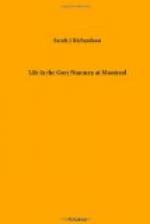As this unhappy young gentleman was one day walking with another, he met two Capuchin friars, and turning to his companion, when they had passed, “what fools,” said he, “are these, to think they shall gain heaven by wearing sackcloth and going barefoot! Fools indeed, if they think so, or that there is any merit in tormenting one’s self; they might as well live as we do, and they would get to heaven quite as soon.” Who informed against him, whether the friars, his companion, or somebody else, I know not; for the inquisitors never tell the names of informers to the Counsellors, nor the names of the witnesses, lest they should except against them. It is to be observed, that all who hear any proposition that appears to them repugnant to, or inconsistent with the doctrines of holy mother church, are bound to reveal it to the Inquisitor, and also to discover the person by whom it was uttered; and, in this affair no regard is to be had to any ties, however sacred. The brother being bound to accuse the brother, the father the son, the son the father, the wife her husband, and the husband his wife; and all bound on pain of eternal damnation, and of being treated as accomplices if they do not denounce in a certain time; and no confessor can absolve a person who has heard anything said in jest or in earnest, against the belief or practice of the church, till that person has informed the Inquisitor of it, and given him all the intelligence he can concerning the person by whom it was spoken.
Whoever it was that informed against my unhappy friend, whether the friars, his companion, or somebody else who might have overheard him, the Inquisitor acquainted the board one night, (for to be less observed, they commonly meet, out of Rome, in the night) that the above mentioned propositions had been advanced, and advanced gravely, at the sight of two poor Capuchins; that the evidence was unexceptionable; and that they were therefore met to determine the quality of the proposition, and proceed against the delinquent.
There are in each Inquisition twelve Counsellors, viz: four Divines, four Canonists, and four Civilians. It is chiefly the province of the divines to determine the quality of the proposition, whether it is heretical, or only savors of heresy; whether it is blasphemous and injurious to God and His saints or only erroneous, rash, schismatical, or offensive to pious ears. The part of the proposition, “Fools! if they think there is any merit in tormenting one’s self,” was judged and declared heretical, as openly contradicting the doctrine and practice of holy mother church recommending austerities as highly meritorious. The Inquisitor observed, on this occasion, that by the proposition, “Fools indeed” &c., were taxing with folly, not only the holy fathers, who had all to a man practised great austerities, but St. Paul himself as the Inquisitor understood it, adding that the practice of whipping one’s self, so much recommended by all the founders of religious orders, was borrowed of the great apostle of the gentiles.




